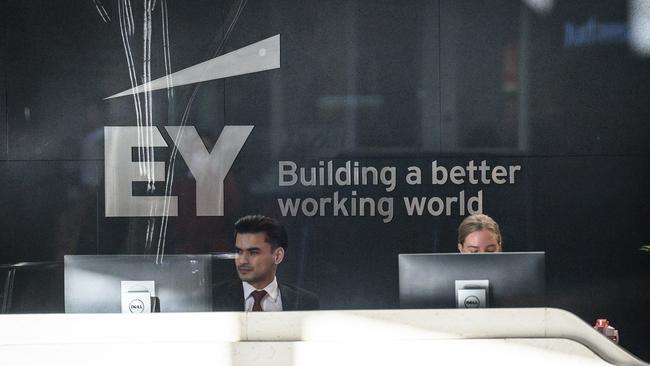
Partners in the EY firms in about 150 countries will vote on whether to split into separate audit and consulting entities – part of a disruption almost certain to spread across the big four.
China’s decision to stay out (regulators there were not happy) is just one example of how the firm of 13,000 partners, 312,000 employees and (foreshadowed) global revenue of $US45bn this year is far from homogenous.
Breaking up EY involves not just a significant cultural shift, but navigating different voting rules in various countries and a mosaic of regulations.
EY’s 700 Australian partners will vote in December/January but the local firm is still sorting out the voting rules. And while where most partners land will be logical, there is likely to be negotiations around the future of some tax partners, for example.
On any ordinary day, the crew at EY would have been the obvious advisers on such a vast operation, but the firm has called in Rothschild as an independent adviser to partners in the European and Asia-Pacific region, including Australia, on the deal.
That deal is in essence a buyout by the consulting partners of the audit partners, a cashing out likely to yield payments of at least $US2m to the auditors and in some cases many times that.
Now that’s a payday, given audit partners can remain in the EY partnership for business as usual – and retain the name and the brand. (Or take their winnings and join a rival firm.)
But it’s the consultants who could end up grinners, walking away with a standalone consulting operation that will be publicly listed, and with shares reported to be worth $US8m to $US11m.
The split would leave audit (termed AssureCo in documents) with about $US18bn in value, and consulting (NewCo) with $US25bn, but partners are being urged to vote yes on the basis NewCo’s value will bounce up to $US100bn in short order.
The Australian split is also likely to be 60/40. FY22 revenue grew by 19 per cent to $2.75bn but you can see why some partners will love the split – audit and assurance grew by 8 per cent last year, but consulting enjoyed a 24 per cent boost.
The local firm says NewCo will comprise consulting, the majority of tax (including law), strategy and transactions and managed services, while AssureCo will also be “multidisciplinary” but focused on assurance, tax and the advisory services seen as necessary for a good audit.
Interestingly, the relatively new area of climate sustainability will remain in audit.
Globally, auditors will stay in the partnership structures generally demanded by regulators, while consultants will trade the opaqueness of a partnership for the scrutiny and reporting pressures of a corporation. But they will be free to pursue audit clients they cannot currently advise because of conflicts of interest.
With the ability to raise capital (hard to do as a partnership), NewCo could move into lucrative service partnership agreements with some of the giants of Silicon Valley – Amazon, Google et al. Indeed what was portrayed as a split driven by regulators when it was first revealed late last year is now clearly about profits.
Melbourne University accounting professor Ian Gow – who with Stuart Kells wrote the 2018 book The big four: The curious past and perilous future of the global accounting monopoly – says: “They (consulting partners) are basically buying them (the auditors) out, saying, OK, you can build a business, and we’re going to take consulting and do all this other stuff.”

Even so, regulators in Britain especially will be more comfortable with an audit-only business, Gow says.
This is not the first time such firms have split: conflict of interest issues forced several (including EY) to hive off consulting divisions more than 20 years ago. But over time, the big four have experienced “consultancy creep”, buying up advisory firms or hiring specialists dealing with everything from AI to legal, Indigenous business and climate change and once again playing strongly in a space previously vacated.
While ASIC regulates the audit side in Australia, there is little scrutiny of consulting work, although the partnerships have responded to community, client and employee expectations, releasing impact reports or scorecards on gender and diversity, environmental responsibility, and mental health support as well as reporting cases of sexual and other harassment. As big employers of young people who enter as graduates, the firms have moved with the times on issues from same-sex marriage to the Indigenous voice to parliament.
They can often face challenges around workplace culture, including long working hours.
All EY employees this week had a day off – an extra “unplugged” leave day to help staff recover from the Covid years. The firm is also dealing with the suicide of one of its young Sydney audit staffers and has announced a review of culture, workplace practices and “psychological safety”.
The traditional partnership model, suited to audit work, has set the big four apart – deeply embedded in the big end of town, yet strangely aloof. One former partner at a big four says the firms are “planets unto themselves, their own ecosystems”.
Deloitte, KPMG and PwC are closely watching the EY play while publicly committing to their partnerships. Bloomberg reported that Deloitte’s global CEO Punit Renjen went as far as saying: “We will not monetise our collective life’s work (or that of the generations that preceded us).”
Given the potential for millions of dollars in payouts, don’t hold your breath on that one.




China has, in effect, already voted no, but it will be months before we know which parts of the Ernst & Young empire agree to one of the biggest structural shifts in professional services for two decades.